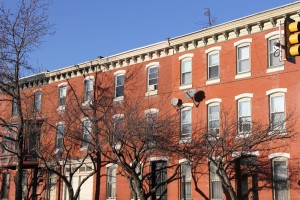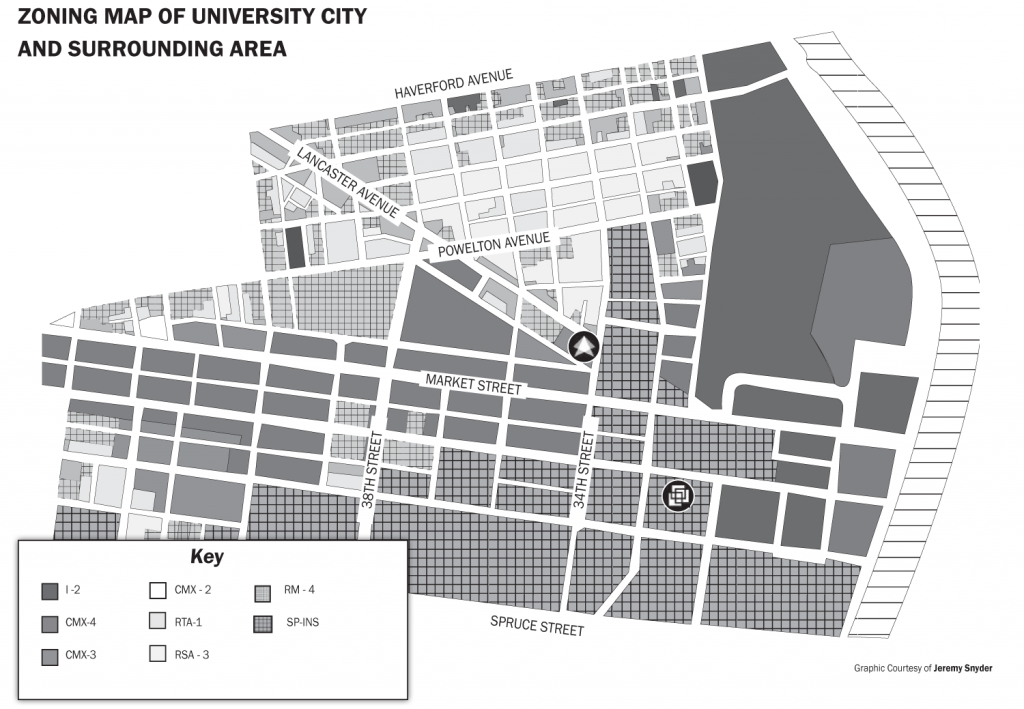
Drexel University is tangling with property owners in Powelton Village in order to restrict students from living off-campus. Drexel has backed the Powelton Village Civic Association in defending a law that prohibits more than three unrelated people living in the same house. The University has promised the PVCA to bring students back on campus, including potentially forcing students as old as juniors to live in University and University-affiliated housing by 2024.
These changes in policy were first brought to light due to a court case prompted by the recent reemergence of a zoning law that makes it illegal for a group of more than three unrelated people to live together. Litigation arose beginning in April 2013 as the result of an ongoing dispute between the PVCA and the Drexel Area Property Association on the topic of zoning laws — particularly those in the Powelton Village area.
“From time to time, [Licenses and Inspections] has descended upon some large houses in the Powelton area where there are college students and demanded to know how many people are living there or asked to come in and inspect,” Bart Caprario, president of the DAPA, said when asked about what prompted the lawsuit. “Upon finding out that there were more than three people, they basically shut the house down.”
Caprario and the DAPA believe this zoning law harms students and they assert that the law is being used out of its intended context. Originally put in place to discourage brothels and prostitution in the city, the DAPA feels it is now being used for the sole purpose of corralling college students. The organization was founded about two years ago, largely to fight this law but also to have more of a say in zoning of the area.
Around the same time, a DAPA member began to fight the law, calling it unconstitutional. The case, Schwartz et al v. Zoning Board of Adjustment, reached the courts in April 2013 and has pulled in many different parties: five groups split into sides based on their beliefs. Tenants, landlords, civic associations, the City of Philadelphia and Drexel itself — the largest landlord in the Powelton area — all came together to argue one way or another on the matter. DAPA’s position received support from various landlords and tenants; some arguing the repeal of the law considering the context of college student living conditions, others citing the changing definition of family in modern times. Drexel and the PVCA wanted to keep the law in place.

Proceedings in the Court of Common Pleas came to an end with the law intact — the lawsuit was unsuccessful in proving it unconstitutional. The DAPA does not see this as the end however, and its members appealed to the Superior Court in July 2014.
“We are unable to discuss the specifics because of the open court case, but we can say that the PVCA has an interest in seeing zoning laws which protect the health and well-being of citizen enforced,” the PVCA organization explained via email when asked about the reasoning behind their position. “Most large municipalities have similar ordinances in place which restrict the number of unrelated individuals from living in a single housing unit, and the law has been repeatedly upheld when challenged in court.”
The Triangle also reached out to Drexel University, asking for some elaboration on the position it took in the case — a position that the DAPA claims goes directly against students.
“At Drexel University, our top priority is the safety and well-being of our students. These rules and regulations were put in place to ensure students and tenants live in well-maintained and safe environments,” a University representative stated in an email.
Both Drexel and the PVCA cited two key points in defense of their stance, the first being the option for a landowner to obtain a rooming house license. This special exemption allows a landowner to rent to more than three unrelated persons in a single home, but places additional requirements on the property, such as needing a fire escape.
DAPA sees this a poor excuse for the stringent zoning codes. “It’s a myth, really,” Caprario said, especially in the Powelton Village area. “It’s very difficult to get the zoning for a rooming house. One of our members tried to do it with a house on Spring Garden and she was shot down by the zoning board almost instantly.”
A second key point was a recent Boston student-housing situation. A Chronicle article published Jan. 2 outlined the city’s inspection of over 580 off-campus student residences that could be unsafe due to overcrowding — especially in the case of fire, which claimed two student lives in the past three years. In many ways, it seems to parallel Drexel’s housing situation — urban schools with students forced off campus, to cheaper homes with more roommates than permitted by law.
Caprario agrees with the argument in favor of safer student living, but isn’t sure if that is the sole drive behind the University’s actions. “What Drexel seems to be doing is driving the rentals into their own properties, properties that they’re in a financial arrangement with the owners.” He also noted that because of Drexel’s status as an institution, the zoning laws work in their favor. “It’s frustrating from my perspective. These kids are paying 700-800 dollars a student for a two-bedroom apartment, while we’re trying to rent five or six bedroom apartments for much less. These beautiful houses that are perfect for students are rendered useless now.”
This court case, while meaningful in its own right, services as just one example of Drexel’s continued efforts to rein students back into on-campus housing. Outlined in a Letter of Intent between Drexel and the Powelton Village Civic Association, it is stated that “Both parties agree that it is important to stabilize the homeownership base in Powelton Village.”
This is with the intention to increase Powelton Village homeownership to 25 percent by 2024. Drexel then goes on to describe their role in this movement, beginning a long list of initiatives to “address the institution’s interest to improve the local neighborhoods surrounding the campus by returning our students to campus and simultaneously restoring the integrity of Powelton Village.” The changes in housing requirements and regulations, specifically those applying to off-campus housing are numerous and have the potential to affect a large portion of the student body.
Listed in section one, “Enhance the Drexel Approved Housing Program”, are 14 points on the topic, each describing serious changes to be made from the date of publication (May 23rd, 2013) and on until 2024. Notable on this list of changes is in point K – “By September 2015, the approved housing program would exclude properties that have obtained variances after December 31st, 2013 for the purpose of renting to more than 3 unrelated persons per dwelling unit”, with the only exception to be applied to fraternity/sorority housing.
This comes in stark contrast to Drexel’s statement on the lawsuit, as it effectively halts any new houses from entering the system and would make the efforts of any landlords currently applying for the variance futile.
Also directly affecting houses occupied by students in the Powelton Village area is the impending safety inspection: “Safety inspection in 2015- Inspections should occur at least annually to ensure that standards for safety are being upheld.” This requirement, paired with known shutting-down of houses rooming more than 3 unrelated people could result in many homes being examined in depth and the possible displacement of many students.
The point that has the potential to affect the most students, however, is the complete revision of the university housing, affiliated housing, and approved housing policy listed in point J. This point, in full, states: “Drexel shall endeavor to provide sufficient student housing in the form of University housing, University affiliated housing, and University approved housing to include pre-juniors in the program by 2018, or as soon thereafter as possible.”
“By 2018, Drexel will develop a communication plan to encourage juniors and create incentives for promoting juniors living in Drexel affiliated facilities or Drexel approved housing. By 2024, Drexel and PVCA shall meet to consider adding juniors to the program, with such consideration to include a mutual review of all data and progress made by that time, including the occupied homeownership rate in Powelton Village as updated by Drexel in 2024.”
This statement frames what can be expected of Drexel’s actions regarding housing for years to come and sheds light on why exactly Drexel may have lobbied in the case as they did: the University’s end goal is to move students out of Powelton Village and back onto campus with the intention of keeping them there as long as possible.
These changes have taken many students by surprise, leaving them feeling blindsided and shocked by the University’s actions. “When I transferred here, I applied to be in a dorm, and they didn’t have enough housing for me. It’s weird that they’re moving kids out of Powelton when there isn’t enough housing here yet and it’s all so expensive” noted sophomore history major Tyler Countie. Countie says he was lucky to have found housing at all, currently residing in Chestnut Square with three other roommates in a two bed/two bath option.
Austin Paragas, sophomore entertainment and arts management major and Tyler’s roommate, believes students should have more of a choice as to where they can live. “It sounds like Drexel is trying to create a monopoly. I understand what they’re trying to do, which is make more money, but the only thing that on-campus or University affiliated housing has as an advantage is how close to campus it is.” Both students firmly believe cost should be a key factor for Drexel to examine if they wish to push these new policies into action.
While the issue of the law remains unresolved as it is still in court, the best action for students seems to be keeping updated on the topic. Bart Caprario advocates as much transparency and communication on the topic as possible. “People should know, really. We’re trying to get a bit of publicity on the topic since it has the potential to affect so many students, who don’t even know anything about it.”


